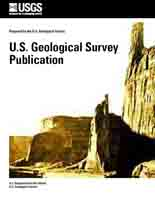Hydrogeology, ground-water development alternatives, and water quality in the Big�Mishnock stream-aquifer system in central Rhode Island are being investigated as part of a long-term cooperative program between the Rhode Island Water Resources Board and the U.S. Geological Survey to evaluate the ground-water resources throughout Rhode Island. The study area includes the Big River drainage basin and that portion of the Mishnock River drainage basin upstream from the Mishnock River at State Route 3. This report presents geologic data and hydrologic and water-quality data for ground and surface water.
Ground-water data were collected from July 1996 through September 1998 from a network of observation wells consisting of existing wells and wells installed for this study, which provided a broad distribution of data-collection sites throughout the study area. Streambed piezometers were used to obtain differences in head data between surface-water levels and ground-water levels to help evaluate stream-aquifer interactions throughout the study area. The types of data presented include monthly ground-water levels, average daily ground-water withdrawals, drawdown data from aquifer tests, and water-quality data. Historical water-level data from other wells within the study area also are presented in this report.
Surface-water data were obtained from a network consisting of surface-water impoundments, such as ponds and reservoirs, existing and newly established partial-record stream-discharge sites, and synoptic surface-water-quality sites. Water levels were collected monthly from the surface-water impoundments. Stream-discharge measurements were made at partial-record sites to provide measurements of inflow, outflow, and internal flow throughout the study area. Specific conductance was measured monthly at partial-record sites during the study, and also during the fall and spring of 1997 and 1998 at 41 synoptic sites throughout the study area.
General geologic data, such as estimates of depth to bedrock and depth to water table, as well as indications of underlying geologic structure, were obtained from geophysical surveys. Site-specific geologic data were collected during the drilling of observation wells and test holes. These data include depth to bedrock or refusal, depth to water table, and lithologic information.


